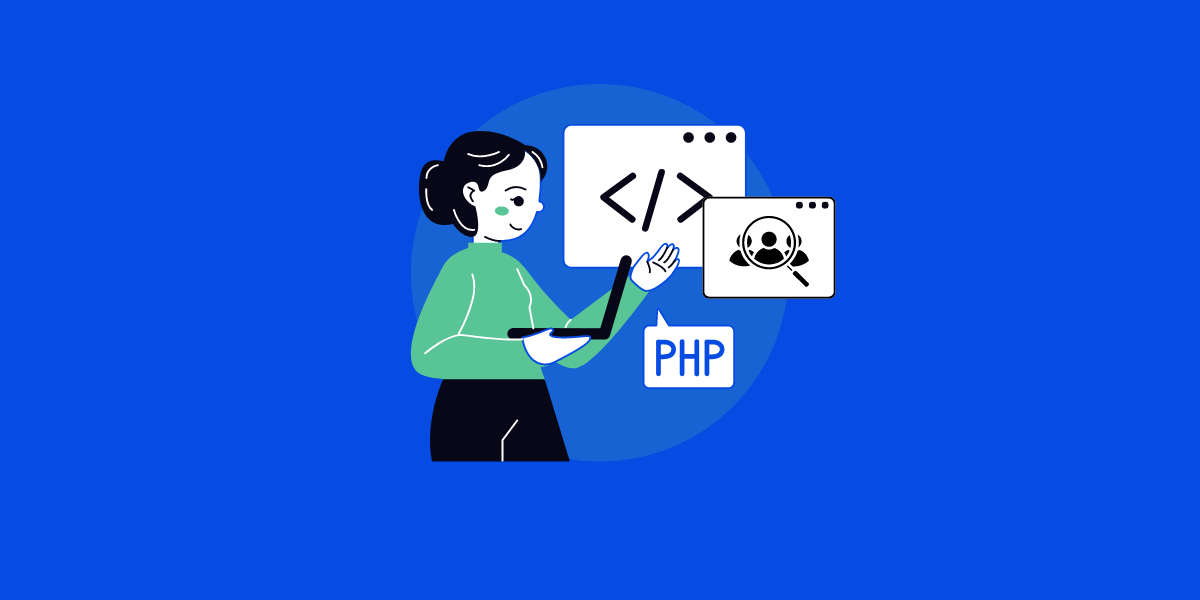Hire remote PHP developers that you can trust
Hire PHP developers from a unique network of 50,000+ pre-vetted offshore talents from Europe and Latin America, looking for a full-time contract. YouTeam developers stand apart for their ability to think like product managers and act like software architects. We also manage everything, so there’s zero overhead for your company.
Hire developers243 best PHP developers for hire on YouTeam in February 2025

Dmitriy
Senior Magento Back-End Developer
Olena
Senior PHP Developer
Andrew
Certified Magento 2 Developer
Ramiro
Software Developer
Alfio
Project Manager
Viacheslav
Lead PHP Developer
Osvaldo Escobar
Senior Software Developer
Arshak
Full-Stack Python Developer
Fiorella
Full-Stack Developer
Sergio
Full-Stack EngineerStart hiring to
see all talent
Hire
developers

Best Developer
Full-Stack EngineerTrusted by Fortune 500 companies and Y Combinator startups
Why hire PHP developers with YouTeam
 48-hour personalized matching
YouTeam handpicks the best-matched candidates.
48-hour personalized matching
YouTeam handpicks the best-matched candidates.
 Zero overhead
Locally-compliant contracts and billing
Zero overhead
Locally-compliant contracts and billing
 Dedicated white-glove support
Dedicated white-glove support






How to hire PHP developers with YouTeam
Share your requirements Set up a quick call with one of our Matching Experts — your dedicated contact at YouTeam.
Undergo Personalized Matching Your Matching Expert curates a candidate list, conducts pre-interviews, and ensures a perfect match for your needs—covering developers' skills, tech stack preferences, interests, and personality.
Meet the right candidates Review a list of candidates screened specifically for your request and pick the best for the interview stage. Average interview-to-hire ratio on YouTeam platforms: 1.75.
Hire and work with confidence YouTeam automates contract signing and invoicing through its secure system. Your dedicated Matching Expert stays with you throughout the collaboration with contractors.

Find developers skilled in related technology
More technologiesRead about PHP on our blog
 10 Interview Questions to Ask a Senior PHP Developer (+Expected Answers)
10 Interview Questions to Ask a Senior PHP Developer (+Expected Answers)
Svetlana Shevchuk
 How to Hire a PHP Developer in 2024: What You Need to Find a Perfect Fit
How to Hire a PHP Developer in 2024: What You Need to Find a Perfect Fit
Mary Atamaniuk
About PHP
- What is PHP?
- Key use cases for PHP
- PHP tech stack: Key components
- What is the role of a PHP developer?
- PHP developer experience levels
- Tasks and responsibilities of PHP developers
- Skills to look for in a PHP developer
- Types of PHP developers: Freelancers, in-house engineers, and outsourced programmers
- How to write the PHP developer job description
- PHP developer salaries
PHP (Hypertext Preprocessor) is a widely-used open-source server-side scripting language designed primarily for web development. Initially created by Rasmus Lerdorf in 1994, PHP has grown into one of the most popular languages for building dynamic websites and web applications. It is especially valued for its versatility and ease of integration with HTML and databases, particularly MySQL. Over the years, PHP has evolved with the release of modern versions that include object-oriented programming features, improved performance, and enhanced security, making it suitable for both small projects and enterprise-level applications.
PHP’s adaptability and deep integration with server-side technologies make it a natural fit for a wide range of web applications. Its simplicity, combined with a large community and extensive library support, makes PHP a practical choice for both foundational applications and more advanced, data-driven systems. Below are some of the key scenarios where PHP proves particularly useful.
- Websites and Web Applications: PHP is a foundational language for web development, widely used for creating dynamic and content-driven websites. Platforms like WordPress and Drupal, which power millions of sites, are built using PHP.
- E-commerce Solutions: PHP frameworks like Magento and PrestaShop offer robust solutions for building online stores, with functionalities like inventory management, payment gateways, and customer relationship management (CRM).
- CMS Platforms: Content management systems like WordPress, Joomla, and Typo3 run on PHP, enabling businesses and individuals to manage their websites easily without needing to code.
- API Development: With frameworks like Laravel and Symfony, PHP developers can create RESTful APIs to power mobile applications or integrate third-party services.
- Custom Web Applications: PHP is commonly used to develop customized web solutions tailored to specific business needs, such as enterprise resource planning (ERP) systems or customer portals.
- Social Networks and Forums: Many popular social networking platforms, such as Facebook (in its early stages), and forum platforms like phpBB, were built using PHP, showcasing its ability to scale for high-traffic environments.
- Data-Driven Applications: PHP can be used to create web applications that process and display data in real-time, including dashboards, analytics platforms, and content aggregators.
The PHP ecosystem consists of a variety of tools and technologies that complement the development process. Here are some key components of the PHP tech stack:
- PHP: The core language, renowned for its ease of learning and integration with databases and other web technologies.
- MySQL: A popular open-source relational database management system commonly used with PHP for building data-driven web applications.
- Apache/Nginx: PHP often runs on web servers like Apache or Nginx, which deliver content and process server-side code.
- Composer: A dependency management tool for PHP, Composer allows developers to manage external libraries and packages efficiently.
- PHP Frameworks (Laravel, Symfony, CodeIgniter): Frameworks such as Laravel and Symfony provide structure and pre-built components, speeding up development and ensuring maintainable code.
- PHPStorm or VS Code: Development environments (IDEs) like PHPStorm and Visual Studio Code are commonly used to write and debug PHP code.
- Xdebug: A powerful debugging and profiling tool for PHP applications.
- PHPUnit: A unit testing framework for PHP, enabling developers to ensure code quality through automated testing.
A PHP developer is responsible for creating, maintaining, and optimizing web applications using PHP. They write server-side logic, manage databases, and ensure that applications meet business and technical requirements. PHP developers also collaborate with front-end developers, troubleshoot issues, and ensure applications are secure and scalable. Depending on the complexity of the project, they might integrate third-party services, optimize for performance, and provide post-launch support.
PHP developers can be categorized into three main experience levels:
Junior PHP Developers
- Experience: 0-2 years.
- Skills: Basic knowledge of PHP, HTML, CSS, and SQL. Familiarity with a PHP framework or CMS (e.g., WordPress) is common.
- Role: Typically assigned simpler tasks like bug fixes, updates, or small feature implementations, and work under supervision.
Mid-Level PHP Developers
- Experience: 3-5 years.
- Skills: Solid understanding of PHP frameworks, object-oriented programming (OOP), and API development. Proficient in SQL and able to manage both front-end and back-end integration.
- Role: Independent contributors who handle full projects or larger features, collaborating with teams and offering technical insights on architecture and design.
Senior PHP Developers
- Experience: 5+ years.
- Skills: Expertise in PHP frameworks, design patterns, database architecture, and API integrations. Strong focus on performance optimization, scalability, and security. Experienced in mentoring junior developers and leading teams.
- Role: Leads development efforts, responsible for making architectural decisions, optimizing performance, and ensuring code quality.
PHP developers typically perform a range of tasks depending on their experience level:
- Application Development: Writing and maintaining the PHP codebase for websites or applications.
- Database Management: Developing database schemas and writing queries to ensure smooth data management.
- Performance Optimization: Analyzing and improving code and database performance to ensure quick response times.
- API Integration: Creating or integrating external APIs to extend the functionality of the application.
- Security: Implementing security best practices, such as data validation and encryption.
- Testing: Writing unit tests to ensure code reliability and minimize bugs.
- Collaboration: Working with front-end developers, designers, and other team members to ensure seamless integration of the back-end with the front-end interface.
- Documentation: Creating clear documentation for future developers and maintaining it for code updates.
When hiring a PHP developer, some of the key skills you should prioritize include:
- Proficiency in PHP: In-depth understanding of PHP and its modern features, such as OOP, closures, and namespaces.
- Experience with PHP Frameworks: Hands-on experience with popular frameworks like Laravel, Symfony, or CodeIgniter.
- Database Expertise: Strong skills in SQL and experience with databases like MySQL, PostgreSQL, or MongoDB.
- Front-End Technologies: Familiarity with front-end languages like HTML, CSS, JavaScript, and relevant frameworks (Vue.js, React).
- API Development: Experience in developing and consuming RESTful APIs and using JSON for data exchange.
- Version Control: Proficiency with Git and version control workflows.
- Testing and Debugging: Knowledge of testing frameworks (PHPUnit) and debugging tools.
- Security: Familiarity with security practices, such as data sanitization, encryption, and protecting against vulnerabilities like SQL injection or XSS.
When considering PHP developers, businesses can choose from three common options:
- Freelance PHP Developers: Ideal for small or short-term projects, freelancers provide flexibility and often lower costs. However, finding a highly skilled freelancer for larger or more complex projects can be challenging.
- In-House PHP Developers: Full-time developers dedicated to your project offer deeper engagement and higher quality of work. However, hiring in-house can be more expensive, with additional costs for salaries, benefits, and office resources.
- Outsourced PHP Developers: Outsourcing to agencies allows businesses to scale quickly and access skilled PHP developers for specific tasks. While cost-effective, outsourcing may result in less direct control over the development process.
Here’s a guide to writing an effective PHP developer job description:
- Job Title: Clearly state the role, such as “PHP Developer” or “Senior PHP Developer.”
- Company Overview: Provide a brief description of your company and what makes it unique.
- Job Responsibilities: List the key tasks like developing and maintaining PHP-based applications, database management, and integrating third-party services.
- Required Skills: Include necessary skills such as proficiency in PHP, experience with frameworks like Laravel or Symfony, database management, and front-end technology knowledge.
- Education and Experience: Specify the desired level of education and experience, such as a degree in Computer Science and 3-5 years of PHP development experience.
- Salary and Benefits: If possible, include a salary range and outline benefits, such as health insurance, remote work options, and professional development opportunities.
- Application Process: Clearly explain how to apply and any necessary application materials, such as a resume or portfolio.
The average salary for PHP developers varies depending on the region and level of experience:
- United States: Junior developers earn between $55,000 to $70,000 annually, while mid-level developers can make $70,000 to $90,000. Senior developers with extensive experience may command salaries upwards of $100,000 to $130,000.
- Eastern Europe: Salaries are generally lower, with junior developers earning between $20,000 and $35,000, mid-level developers around $35,000 to $50,000, and senior developers reaching $50,000 to $70,000.
- Latin America: Junior developers can earn between $15,000 to $25,000, mid-level developers $25,000 to $45,000, and senior developers can earn $45,000 to $60,000, depending on the country and demand.
The variance in salaries across regions can be attributed to local economic factors and the demand for PHP expertise.
FAQ about Hiring PHP developer
Why choose YouTeam to hire PHP developers?
YouTeam offers access to a highly qualified pool of PHP developers, helping you scale your team quickly. Each developer is thoroughly vetted, ensuring their skills, experience, and reliability. With partnerships across 500+ development agencies and over 50,000 developers, you can receive qualified candidates within 48 hours, making it a fast and reliable solution for your hiring needs.
How does YouTeam vet PHP developers?
YouTeam follows a multi-stage vetting process. First, developers are sourced from trusted development agencies, ensuring they meet the necessary skill and experience requirements. Pre-screened candidates are then forwarded to clients for further interviews, allowing them to select the best fit based on specific project needs.
How much does it cost to hire the best PHP developers through YouTeam?
The cost of hiring PHP developers on YouTeam varies based on factors like expertise, location, and skills. On average, a PHP developer through YouTeam charges around $46 per hour, though rates can fluctuate depending on specific project requirements.
How quickly can you hire with YouTeam?
With YouTeam, you can hire developers faster than traditional methods. Here’s why:
1. Shortlist in 48 hours: Powered by our AI Matchmaker and human experts, we deliver a tailored shortlist of vetted candidates within just 48 hours.
2. Larger talent pool: As a marketplace, YouTeam offers access to a broader range of developers from hundreds of partner agencies, giving you more options than typical outsourcing agencies.
3. Seamless process: From the moment you request a call, our Matching Experts handle the rest, ensuring you quickly receive top-quality candidates who match your precise requirements.
YouTeam helps its clients build development teams within just a few weeks, not months.
What is the no-risk trial period for YouTeam developers?
1-Month Trial: You can terminate the engagement at any time during the first month.
Free Replacements: If you’d like to replace a contractor, we’ll do it within two weeks, free of charge.
You can learn more by reading our Money-Back Guarantee.
How is YouTeam different from freelance portals for hiring PHP developers?
Unlike freelance platforms, YouTeam connects you with developers from trusted software development agencies, not freelancers. This ensures that developers have the necessary technical and soft skills, along with relevant experience. If a developer needs to be replaced unexpectedly, YouTeam can quickly provide a substitute of equal skill to avoid project delays.
Reviews
“It's just much more convenient to find a small team. I talk to one person, get 5 hand-picked CVs, interview candidates, hire the best ones – and I’m done!”
“Every time YouTeam sends me a list of potential developers, I am confident that I can interview pretty much anybody and they will be a good candidate.”
“The decision to use YouTeam was made by comparing them directly to the other candidates. As soon as I started talking to them, YouTeam adopted a hands-on approach. Time-wise, YouTeam also performed well.”
“We will definitely continue with them in the future. I’m so happy with their work that I’ve recommended them to my other company as well. There were no issues, it was really good. I gave a very loose brief, and the developer who worked for me had enough initiative to tighten it up by asking relevant questions. There was no messing around—it was done really well, with good, clean code.”
“YouTeam was very quick and responsive. I was presented with great candidates in just days, which was fantastic for me because we were looking to move fast. They had experience working on similar projects to exactly what we needed.”
“We wanted to boost our capacity for a period of six to twelve months. I decided to get a shot with YouTeam is that in any other place I can't say that I'm looking for a team of 5 developers with the possibility to scale. Now I returned to them again - this time for the confidence. If somebody is on the YouTube platform, you know that they've met a certain threshold of customer satisfaction, they've got a history of successful work elsewhere.”










